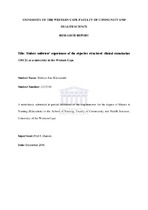| dc.description.abstract | The Objective Structured Clinical Examination (OSCE) is a formative and summative assessment method used in several health science disciplines. The primary focus of this research study was to explore and describe the experiences of student midwives of the OSCE as used in a specific university context and determine how effective it is in preparing student midwives for clinical practice. However the researcher acknowledges the value of the OSCA (Objective Structured Clinical Assessment), which was not used in the context where the study was conducted. Due to the scarcity of academic literature in South Africa and internationally regarding the experiences of student midwives of OSCE assessments, this research study attempted to increase evidence of students’ experiences for improving the OSCE as an assessment method at a school of nursing used in this study. Research purpose: The purpose of the study was to explore and describe student midwives’ experiences of the Objective Structured Clinical Examination, at the SoN, at a university in the Western Cape, and ascertain whether it prepared them adequately for clinical practice. Research design: A qualitative approach with an exploratory descriptive design was used for the investigation of the student midwives' experiences of this assessment method. Sample: Purposive sampling was utilised to select third year Bachelor of Nursing students, who completed the OSCE during semester one in 2014, at a University in the Western Cape. Nine participants were interviewed. Data collection: The data collection was obtained through semi-structured interviews. Data analysis: The data analysis was done manually using the Thomas (2003) data analysis process. Saturation was reached after nine interviews, when no new relevant knowledge was being acquired. Findings: OSCE preparation was supported by theory and clinical learning opportunities. The OSCE environment was found to be challenging and stressful. Alignment of OSCE stations to clinical skills, theory, clinical practice and appropriateness of time allocation. Students had differing views about their level of confidence and competence. Recommendations: Although the OSCE is a valued instrument in the summative assessment of midwifery students, attention must be given to the careful planning of the OSCE environment and the use of simulation techniques. Adequate support for students is essential, and adherence to a standard method of facilitation in clinical learning, in the skills laboratory, is crucial to fairness in learning and assessment. The direct input from valuable stakeholders in clinical training, such as educators and clinical supervisors, must be considered in order to identify ways to improve the OSCE. | en_US |

